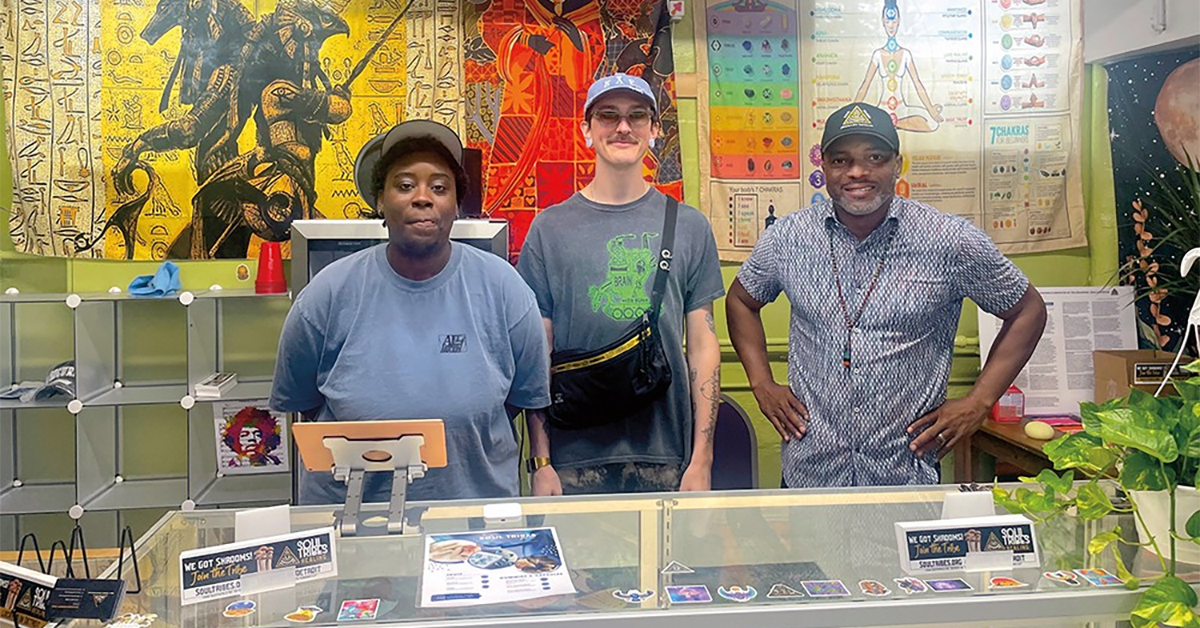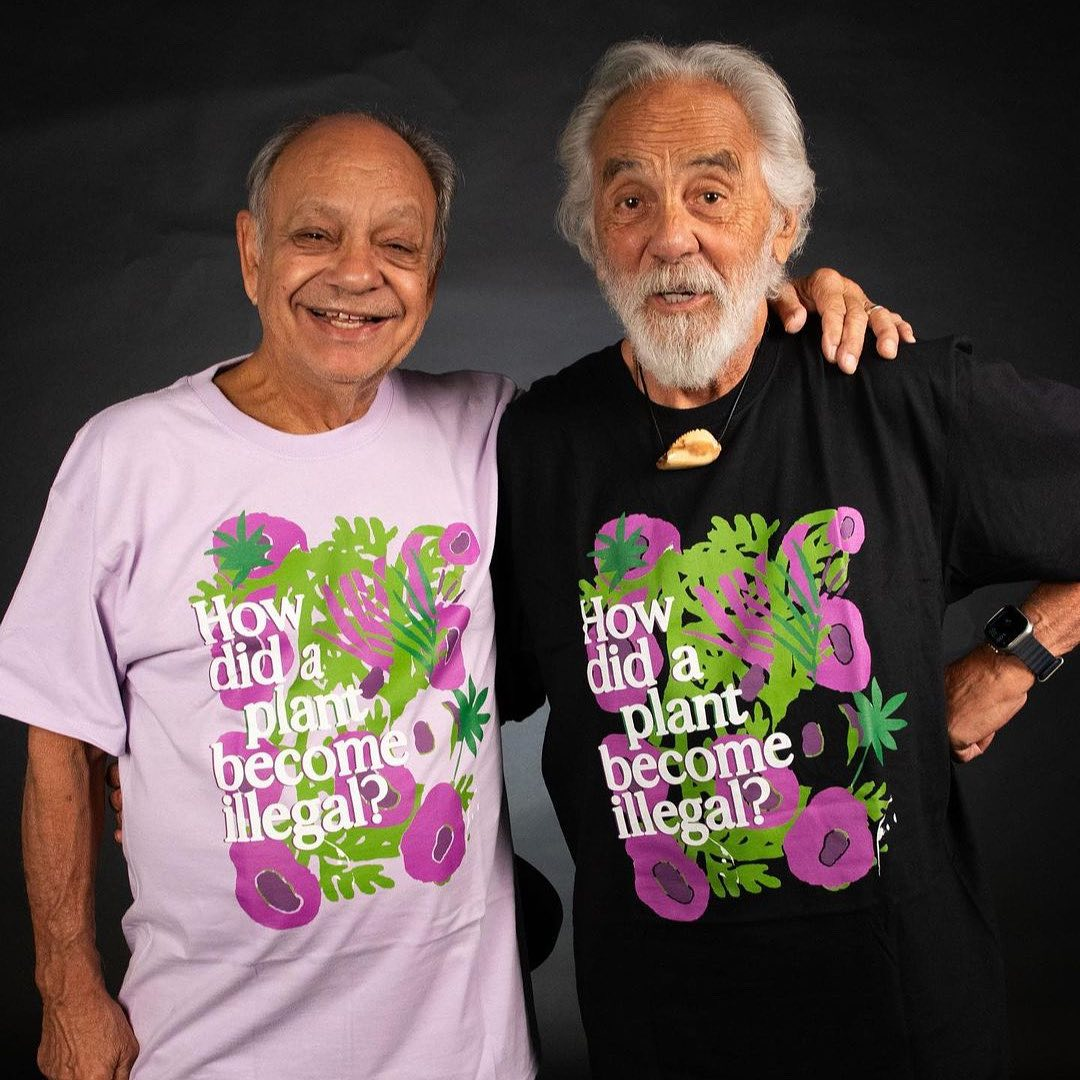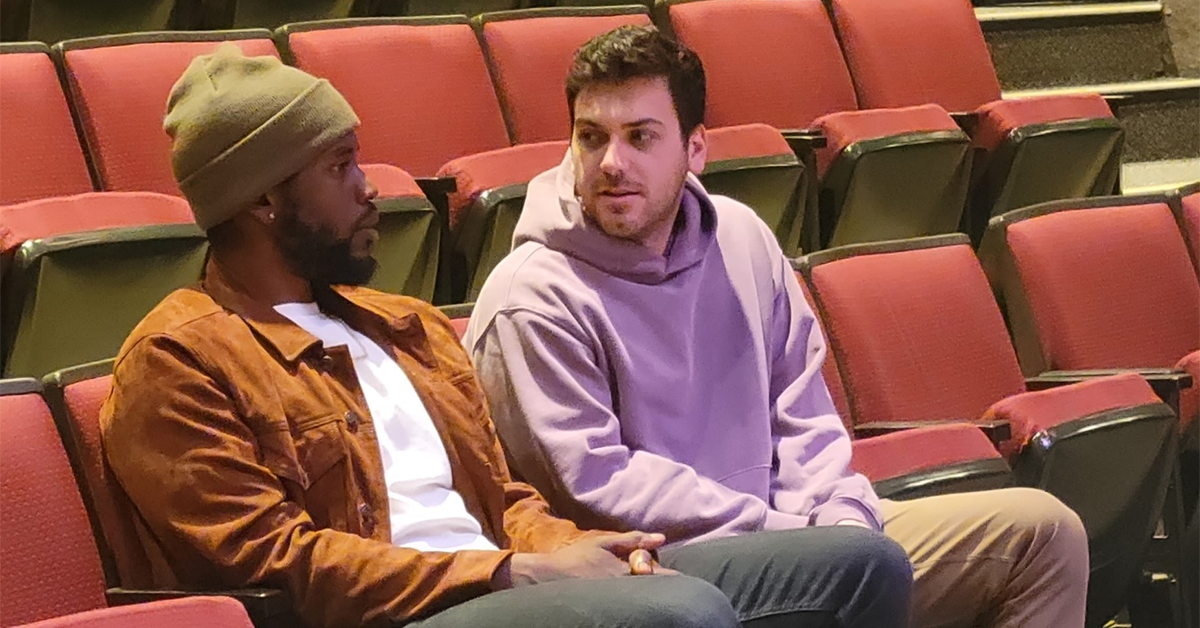Detroit's Psychedelic Church Shifts Legal Battle to Federal Arena

Note to Readers: While the primary focus of our platform remains cannabis-related news, we think it's important to explore the parallel happenings in the realm of psychedelic substances in Michigan, due to its close kinship and its potential implications for future policy-making in related fields. We hope you find the following article enlightening.
Soul Tribes International Ministries, known for advocating the use of psilocybin mushrooms as a religious sacrament, has recently escalated its legal battle by moving the case to federal court. The organization, operating inside Detroit's Bushnell Congregational Church, faced a significant setback when the Detroit Police Department raided the establishment on September 22nd, leading to a temporary restraining order and a nuisance claim against the owner, Shaman Shu, also known as Robert Shumake and Bobby Japhia.
In a notable development on November 6th, Shu initiated the transfer of his case to federal court, citing a violation of the Religious Freedom Restoration Act by the city's shutdown of the church. This move to federal jurisdiction marks a strategic shift in the legal approach of Soul Tribes. However, the City of Detroit has countered this action, petitioning on December 4 to remand the case back to Wayne County Circuit Court, emphasizing that the issue does not involve federal law and is more suited to regional jurisdiction due to its focus on local nuisance concerns.
The transition to federal court led to a significant change in legal representation for Shu. Initially represented by Detroit's Cannabis Counsel, the firm withdrew from the case on November 27th, citing both an "irreconcilable breakdown in the attorney-client relationship" and unpaid fees. The firm's departure followed Shu's decision to move the case to federal court without their knowledge. Shu is now represented by Florida-based attorney George Lake, who is licensed in multiple states and specializes in the free exercise of religion and the sacramental consumption of psychedelics/entheogens. Lake, who also represents clients in similar cases involving ayahuasca ceremonies, brings a unique expertise to Shu's defense.
This legal controversy centers around Soul Tribes' use of psilocybin mushrooms, which they regard as a holy sacrament. The church was selling these mushrooms from a "sacrament center" on its grounds. The Metro Times' coverage of the church in September preceded the seizure of significant quantities of mushrooms and marijuana by Detroit Police, along with the discovery of a laboratory for manufacturing these substances.
Soul Tribes and Shu now plan a $1 billion countersuit against the city, alleging racial and religious discrimination and claiming substantial vandalism and damage to the church property during the period it was padlocked. The countersuit highlights the church's claims of infringement on religious freedoms and seeks to address the economic damages incurred.
The case of Soul Tribes brings to the forefront critical issues regarding the interpretation of religious freedom, the legality of entheogenic substances, and the role of local versus federal jurisdiction in such matters. The outcome of this case could set a precedent for similar situations involving religious practices and controlled substances.
Puff Cannabis Teams Up with Jeeter for Charitable "Jackets for Joints" Drive

Puff Cannabis Company, a Michigan-based enterprise, has launched its second annual "Jackets for Joints" charity event in collaboration with Jeeter, a product of Dreamfields Brand. Starting December 5th and running through December 22nd, this event aims to collect new winter coats for children aged 3 to 12. The company invites customers to participate by donating new coats at any of their locations across Michigan, including Madison Heights, Hamtramck, Utica, River Rouge, Bay City, Oscoda, Traverse City, Sturgis, Monroe, and Kalamazoo.
Since its establishment in 2019, Puff Cannabis has focused on delivering top-tier cannabis products, competitive pricing, and outstanding customer service. The "Jackets for Joints" initiative allows customers to contribute a new coat with its tags still attached in exchange for a complimentary 1-gram Jeeter infused pre-roll or a jar of Baby Jeeter infused pre-rolls, subject to a one-per-customer limit while supplies last.
This campaign is part of Puff Cannabis' ongoing commitment to community support, as emphasized by Justin Elias, the Founder and President of Puff Cannabis. Elias highlights the significance of such initiatives, especially in Michigan, where the need for warm winter clothing is critical. Following last year's successful drive and a recent donation of over 2,500 Thanksgiving turkeys, Elias underscores the importance of supporting local communities and ensuring children are well-equipped for winter.
All jackets and coats collected will be donated to local charities across Michigan, directly aiding children in need. Puff Cannabis encourages everyone to join in this meaningful cause this holiday season, aiming to spread warmth and community spirit. The company has listed its various locations across Michigan to facilitate donations:
- Puff Cannabis River Rouge - 11397 W. Jefferson, River Rouge
- Puff Cannabis Hamtramck - 11931 Joseph Campau, Hamtramck
- Puff Cannabis Madison Heights - 2 Ajax Drive, Madison Heights
- Puff Cannabis Utica - 44825 Van Dyke Ave, Utica
- Puff Cannabis Monroe - 14750 LaPlaisance Rd., Suite 180, Monroe
- Puff Cannabis Kalamazoo - 4305 Portage St, Kalamazoo
- Puff Cannabis Oscoda - 635 S. State St, Oscoda
- Puff Cannabis Bay City - 1680 Marquette Ave, Bay City
- Puff Cannabis Sturgis - 651 Wade Rd, Sturgis
- Puff Cannabis Traverse City - 1226 S. Garfield Ave, Traverse City
For Everyone Collective: Blending Fashion with Social Change in Grand Rapids

For Everyone Collective, a Grand Rapids-based custom screen printing company with a unique social mission, recently inaugurated its first physical retail store on the city's far south side. Located at 2215 29th St. SE, this new storefront, which opened in late October, is situated alongside the company's production facilities.
Distinguished by its commitment to employing formerly incarcerated individuals and their families, For Everyone Collective specializes in custom screen printing and design. The company also has its own line of original clothing, which until now, was available only online. The new 700 square-foot retail space not only offers customers the chance to purchase these designs in person but also provides a welcoming lounge area for both customers and supporters.
Sky Rich, the founder of For Everyone Collective, established the organization in 2018 under the name Forgive Everyone. His aim was to leverage clothing as a medium to spotlight the discrimination faced by people who have been incarcerated. Rich's journey began with an eye-opening realization of the systemic barriers faced by these individuals in areas like employment, housing, and societal acceptance. The initial objective of this screen printing venture was to support prison reentry organizations by donating a portion of each sale.
The evolution of For Everyone from a side project into a full-fledged worker-owned collective is a testament to Rich's dedication and the company's growth. Currently, For Everyone operates out of a 5,000-square-foot space on 29th Street, which encompasses production, design, shipping facilities, and now the new storefront. Despite its relatively small team and modest beginnings, For Everyone has impressively fulfilled 10,000 orders for its custom designs in 2023 alone, averaging about 2,000 screen-printed shirts weekly.
For Everyone's ethos extends beyond just creating meaningful designs. It emphasizes ethical business practices, including paying employees above-living wages, offering comprehensive benefits like free dental, health care, and life insurance, providing unlimited time off, and using ethically-sourced materials.
A notable highlight for For Everyone has been its collaboration with the Last Prisoner Project, a national cannabis reform nonprofit, and the renowned comedy duo Cheech Marin and Tommy Chong. This partnership, which focused on a cannabis-themed design, saw Cheech and Chong sporting the shirts in promotional images. A portion of the proceeds from this collaboration was donated to support Last Prisoner Project's constituent support services.

Last Prisoner Project's Sarah Gersten commended the partnership, emphasizing the shared mission of advocating justice for those adversely affected by the War on Drugs. This collaboration aligns with For Everyone's values and their commitment to raising awareness and supporting those impacted by incarceration.
The significance of For Everyone's mission is underscored by statistics from the Prison Policy Initiative, which reported a stark unemployment rate of 27.3% for formerly incarcerated individuals in 2018, in contrast to the general public's 5.8% at that time. In Michigan, these challenges disproportionately impact people of color, with over half of the state's prison population being Black, as reported by The Sentencing Project.
This venture by For Everyone Collective not only marks a significant expansion in its business operations but also reinforces its commitment to social justice and community engagement.
New Study Highlights Frequent Cannabis Use Among Americans Aged 50 to 80

Recent survey data from the University of Michigan at Ann Arbor reveals a notable trend: over 12% of American adults aged between 50 and 80 have used cannabis products in the past year. This information, derived from the National Poll on Healthy Aging, reflects a growing acceptance and use of cannabis among older demographics.
The survey's findings are significant, with more than one-third (34%) of these older cannabis users reporting usage four or more days per week. This statistic underscores not only the prevalence of cannabis use in this age group but also the regularity of its consumption.
Paul Armentano, Deputy Director of NORML, commented on the study, noting the increasing trend of cannabis use among older adults. He attributes this rise to the growing recognition of cannabis as a viable alternative for managing common age-related issues like pain, anxiety, and restless sleep. Many older adults, aware of the severe side effects associated with traditional prescription drugs like opioids or sleep aids, view medical cannabis as a safer option.
The survey aligns with other research indicating a steady increase in cannabis use among older adults and seniors over the past decade. Earlier studies in 2021 also found that most older adults hold positive views about cannabis. Furthermore, several recent studies have linked marijuana use with improvements in the quality of life for seniors.
Delving deeper into the survey's demographics, it was noted that cannabis use varied among different ethnic and social groups. People identifying as Hispanic or other races were less likely to use cannabis compared to non-Hispanic white respondents. Additionally, unmarried/unpartnered and unemployed individuals were more likely to use cannabis, as were those who consumed alcohol.
The findings from this survey, conducted during the first year of the COVID-19 pandemic, highlight a significant trend: over one in ten older adults in the U.S. used cannabis during this period, many frequently. These insights are crucial for clinicians and policymakers, who need to be aware of the increasing use of cannabis among older adults and the potential risks associated with it. As legal access to and attitudes toward cannabis continue to evolve rapidly across the nation, it's important for these stakeholders to monitor and address these trends, ensuring safe and informed use among older populations.
Kalamazoo Alumni Spotlight Injustice in 'Grassland': A Film Blending Art and Advocacy

"Grassland," slated for 2024 film festival premieres, features a narrative set against the 2008 Great Recession backdrop. It tells the story of a Latina single mother running an illegal marijuana business, whose life takes a turn when her son befriends a young white boy and his police officer grandfather. The film, which includes Shon Powell as a consulting producer, highlights racial disparities in marijuana-related arrests, emphasizing that Latinos and Black individuals were disproportionately targeted compared to their white counterparts.
The film stars Mía Maestro, known for "The Strain" and "The Twilight Saga: Breaking Dawn, Part 2," and Jeff Kober, recognized from "The Walking Dead," "Sons of Anarchy," and "China Beach." Quincy Isaiah plays the character of Brandon, bringing a depth of emotion and complexity to the role.
Adam Edery, a Kalamazoo College graduate with a background in anthropology-sociology, was drawn to "Grassland" due to its social justice themes, a passion ignited during his college years. His role in securing funding for the film was a testament to his commitment to storytelling that provokes thought and change.
Isaiah and Edery's collaboration began in Los Angeles, where their shared Kalamazoo College experience fostered a unique bond and understanding, especially regarding social justice issues. Their mutual respect and shared values were pivotal in bringing "Grassland" to life.
The film, devoid of a traditional villain, instead scrutinizes systemic issues in law enforcement and societal norms. It questions the policies and systems that have led to disproportionate incarceration rates for marijuana offenses, especially in light of recent legalizations.
Isaiah views "Grassland" as an opportunity for audiences to connect with characters from diverse walks of life, encouraging empathy and understanding. His portrayal of Brandon, a character grappling with life's challenges and injustices, aims to resonate with viewers on a personal level.
The screening at Kalamazoo College was a meaningful homecoming for Edery and Isaiah. They engaged in deep discussions with students about the film, their careers, and broader societal issues. This interaction highlighted the transformative impact of their college experience on their professional and personal development.
Looking ahead, Edery and Isaiah plan to nominate "Grassland" for film festivals like Sundance and align with social justice campaigns. Their goal is to raise awareness about the ongoing issue of marijuana-related incarcerations and advocate for change, partnering with organizations like the Last Prisoner Project to support individuals still affected by outdated laws.
Isaiah hopes that "Grassland" will inspire action and change, addressing the ongoing injustice faced by individuals incarcerated for marijuana offenses in an era where it has become widely accepted and legal in many areas.
Join House of Dank in Combating Hunger: Participate in the Joint Efforts Canned Food Drive

House of Dank is launching the Joint Efforts Canned Food Drive, a philanthropic campaign focused on aiding local communities in need. This initiative is scheduled to take place from November 24th to December 20th, 2023, across various locations.
In an effort to combat hunger, especially during the holiday season, House of Dank invites the community to participate by donating non-perishable food items at their retail outlets. Demonstrating a profound commitment to this cause, the company has vowed to match every contribution made during the drive, effectively doubling the impact of the donations.
This charitable endeavor is part of House of Dank's longstanding tradition of community support, which began in 2015 with a turkey drive at their original 8 Mile location. The company has a history of substantial contributions, including over $15,000 to local food banks and providing more than 30,000 meals to families during the holiday seasons over the past two years. The Joint Efforts Canned Food Drive is an extension of this tradition, aiming to make a substantial difference in addressing hunger.
Marvin Jamo, the Owner of House of Dank, emphasizes the importance of community solidarity in creating positive change. He views the Joint Efforts Canned Food Drive as a reflection of the company's dedication to meaningful community involvement.
The drive will distribute collected items to local beneficiaries in each city where House of Dank has a presence, ensuring that the aid reaches the communities that support them. House of Dank encourages individuals, businesses, and community groups to join this cause by contributing essential non-perishable items like canned goods, pasta, rice, and cereal.
House of Dank's enthusiasm for community participation in the Joint Efforts Canned Food Drive reflects its belief in collective action for social good. For detailed information on drop-off locations and recommended donation items, interested parties are directed to visit shophod.com.


 Helpful Links
Helpful Links